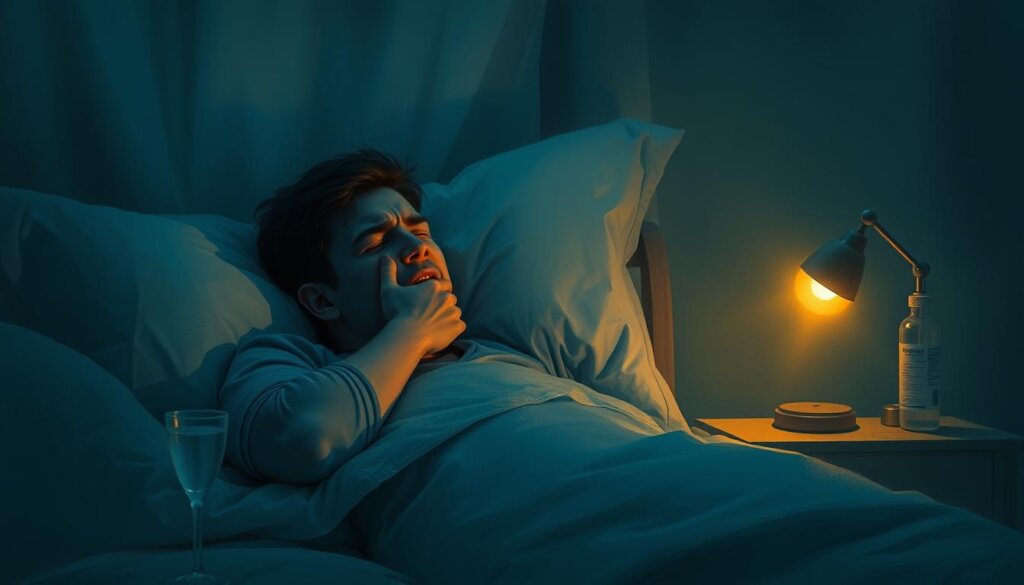Teeth Pain at Night: Why It Intensifies
One out of four adults has faced tooth pain at night. This makes sleeping hard and points to possible dental problems. Nighttime brings worse toothache for some, making them seek ways to manage it. If your teeth hurt at night, it’s a sign to not ignore but to act on, without just taking painkillers.
Finding out why tooth pain is worse at night is key. It’s about biology and how we live our daily lives. Our eating habits and body clocks affect how we feel pain. Knowing this helps us fight tooth pain more effectively. This is a step towards better oral health and understanding our bodies.
Key Takeaways
- Understanding that managing tooth pain at night requires knowledge beyond simple analgesics can lead to more effective and targeted interventions.
- Recognizing the role of circadian rhythms and lifestyle habits is essential for addressing the causes of toothache at night.
- Awareness of the multifaceted nature of nighttime tooth pain can empower individuals to seek appropriate dental care and preventative strategies.
- Appreciating the relationship between body, mind, and oral health can drive more informed choices around managing tooth pain at night.
- Emphasizing the interconnectedness of sleep quality and oral health can motivate ongoing investment in both areas for overall wellbeing.
Common Causes of Nighttime Tooth Pain
Knowing why you get toothaches at night is key if it happens often. Here, we look at several reasons why tooth pain gets worse after dark.
Clenching and Grinding (Bruxism)
Bruxism is mainly when you grind your teeth or clench your jaw at night. It’s usually due to stress or anxiety. This action can damage your teeth over time. It makes them more sensitive and can lead to bigger dental issues.
Tooth Decay and Cavities
Decay and cavities are big reasons for pain at night. Throughout the day, food and bacteria wear down your tooth’s enamel. This damage can hurt more at night because you make less saliva. That makes it easier for bacteria to do harm.
Gum Disease (Periodontitis)
Gum disease, or periodontitis, really affects your teeth at night. It causes pain and sensitivity. This is because inflammation gets worse when your body is resting.
Tooth Sensitivity
If you have sensitive teeth, night-time can be tough. The pain might get worse when you’re lying down. This is because of how blood flows and issues like exposed roots or gums pulling back.
How Your Body Reacts at Night
When the night comes, our bodies deal with tooth pain differently. This is due to specific night time toothache triggers. The way our body changes at night makes tooth pain feel worse, making it important to understand these reactions.
As night falls, we get less busy and notice pain more. Our sleep changes also play a part in making toothaches worse. Here, we will explore what changes at night and why dental pain feels stronger.
Decreased Distraction from Pain
In the daytime, we’re too busy to focus on pain. But at night, it’s quieter, and we notice our pain more. This makes the toothache seem worse and harder to forget.
Changes in Blood Flow
When we lie down, our blood flow changes. Being horizontal makes more blood go to our heads. This can make our teeth and gums feel more pressure and pain at night.
Heightened Awareness of Symptoms
At night, it’s quieter, which makes us more aware of any pain. Even a small toothache can feel bigger and harder to ignore, leading to sleepless nights.
Knowing about these night time toothache triggers can help reduce our pain and help us sleep better. By understanding the reactions of our bodies, we can find ways to ease tooth pain at night.
Lifestyle Factors That Contribute
Lifestyle choices matter a lot when dealing with nighttime tooth pain. Getting to know these factors can help you change your habits. This can make your teeth healthier and less painful.
What you eat plays a big role, especially foods that are acidic, hard, or very cold. Eating these foods before bed can make sensitive teeth hurt more. Also, eating late at night means your teeth are in contact with sugars and acids for longer. This helps harmful bacteria grow in your mouth.
Talking about caffeine and alcohol consumption, it’s important to know they can dry you out. Not having enough water in your body lowers saliva production. Saliva is important because it neutralizes acids from bacteria and protects your teeth.
The influence of stress on dental pain is big too. Stress can make you grind your teeth or clench your jaw without realizing it. This condition, known as bruxism, makes teeth pain and sensitivity worse. Since it often happens when you sleep, it’s a major problem for nighttime toothache.
| Factor | Impact on Nighttime Tooth Pain |
|---|---|
| Dietary Habits | Acidic, hard, or cold foods irritate teeth; sugars fuel bacterial growth. |
| Late-Night Snacking | Increases duration of acid exposure to teeth, promoting decay. |
| Caffeine and Alcohol Consumption | Leads to dehydration and reduces protective saliva production. |
| Stress and Bruxism | Involuntary clenching or grinding exacerbates tooth sensitivity and pain. |
By tackling these lifestyle factors, you can cut down on the chances of getting a bad toothache at night. This will also help you keep your mouth healthy.
Importance of Sleep Position
Understanding how sleep position affects our dental health is crucial. Good sleeping positions help keep head and neck aligned. This can prevent dental pain at night.
Paying close attention to the impact of head and neck alignment is important. It shows us that keeping our spine’s natural curve and jaw aligned reduces facial and jaw stress. This can help ease tooth pain.
Pressure points on teeth from bad sleep positions can make dental pain worse. Changing how we sleep can lessen this stress. This helps with severe toothaches that get worse at night.
For those with sinus issues causing tooth pain, elevation for managing tooth pain at night helps. Using pillows to raise the head can reduce sinus pressure. This pressure often impacts the upper teeth.
Choosing the right sleep position can improve sleep and prevent dental problems. By improving sleep posture, overall dental health gets better. It also reduces the chance of nighttime toothaches.
How to Alleviate Tooth Pain at Night
To manage tooth pain at night, use a mix of over-the-counter meds, home remedies, and dental devices. This combination can provide relief from nighttime tooth problems.
- Over-the-Counter Pain Relievers: Options like ibuprofen or acetaminophen can help by lessening inflammation and pain. This makes sleep more comfortable.
- Home Remedies and Natural Solutions: A warm saltwater mouth rinse can cut down on pain and bacteria. Clove oil on the sore spot may also numb the pain for a bit.
- Using a Mouthguard: For those who grind their teeth, a mouthguard helps. It prevents grinding and protects teeth from damage, which eases pain.
Combining these methods can make a big difference in sleep quality and reduce tooth pain at night. These steps help with immediate pain and are good for your teeth in the long run.
When to Seek Professional Help
Sometimes, tooth pain or discomfort happens, but some signs should make you see a dentist right away. Knowing when to visit a dentist for tooth pain and spotting a dental emergency are key. They help prevent worse problems and get you the right treatment fast.
If your toothache lasts more than a couple of days, get help. Severe pain, swelling, fever, and trouble opening your mouth are red flags. These symptoms mean you should get checked by a professional soon.
Seeing a dentist quickly isn’t just about fixing the pain. It’s also about stopping future dental issues. Treatments might be fillings, root canals, or changes in how you care for your teeth.
Preventive care is also crucial for your teeth. Regular dentist visits, right brushing and flossing, and less sugar help a lot. These steps reduce the risk of tooth pain at night and other emergencies.
Learning the signs of dental emergencies and how to prevent them is important. Good dental habits keep not just your mouth healthy, but also your whole body.
Connection Between Teeth Pain and Other Conditions
Tooth pain can signal other health problems besides just tooth decay or injury. Looking into how sinus infections, TMJ disorders, and nerve-related dental pain link together can shed light on oral health.
Sinus-Related Tooth Pain: A sinus infection can make your upper teeth hurt. This happens because the sinus cavities are right above the upper teeth. When they swell, they can press on the nerves going to those teeth, making the pain worse.
TMJ Affecting Teeth: TMJ disorders can cause tooth pain too. These disorders affect the joints and muscles that let you move your jaw. Inflammation or misalignment here can make your teeth hurt continuously.
Dental Nerve Pain: Severe dental decay can affect the tooth’s inner parts, causing intense pain. This pain can get sharper at night. That’s because lying down can increase pressure in the head area.
Knowing these connections helps in treating tooth pain better. It also helps prevent further issues by treating linked conditions. Good dental care and medical treatment for sinus, TMJ, or nerve issues can greatly reduce pain and boost overall oral health.
The Role of Dental Hygiene
Keeping your dental hygiene top-notch is key to stopping toothaches and keeping your mouth healthy. This is important because toothaches can really hurt, especially at night. A good routine of brushing and flossing stops bad bacteria and plaque, leading to toothaches and gum problems.
Learning how to brush and floss right can greatly lower your chance of dental issues. Use a soft-bristled toothbrush. Clean every part of each tooth with gentle, circular motions. And don’t forget to floss once a day to clean between your teeth. These steps are crucial for your daily dental hygiene.
| Technique | Description | Benefits |
|---|---|---|
| Brushing | Gentle circular motions with a soft-bristled brush | Removes plaque, reduces tooth decay risk |
| Flossing | Daily cleaning between the teeth | Prevents gum disease, reduces toothache occurrence |
| Regular Check-Ups | Professional dental examinations | Early detection and treatment of potential issues |
Also, never skip your dental check-ups. They do more than a regular toothbrush and floss can. They can also find and fix problems early, which stops nighttime tooth pain. So, make sure you see your dentist regularly. It’s a big part of preventing toothaches.
Understanding Tooth Sensitivity
Tooth sensitivity is a widespread issue that interrupts peaceful sleep. It’s crucial to both identify what causes this pain and learn how to manage it, especially at night. This piece will delve into the causes and solutions for tooth sensitivity during nighttime.
What Causes Sensitivity? Worn enamel or receding gums often lead to tooth sensitivity. Also, eating acidic foods or drinking very hot or cold beverages can cause discomfort. This happens because these factors allow external stimuli to reach the tooth’s nerves.
How to Manage Sensitivity Handling tooth sensitivity at night means pinpointing what triggers it and finding ways to prevent these triggers. Using desensitizing toothpaste and avoiding acidic foods before bed are key steps. These actions lessen the pain and can gradually improve the situation.
Products to Consider There are several over-the-counter products beneficial for those battling sensitivity. Dental professionals often recommend these options:
| Product Type | Brand | Key Ingredient | Use |
|---|---|---|---|
| Desensitizing Toothpaste | Sensodyne | Potassium Nitrate | Nightly |
| Fluoride Mouthwash | ACT | Sodium Fluoride | Before Bed |
| Soft-bristled Toothbrush | Oral-B | N/A | Twice Daily |
Since triggers of tooth sensitivity vary, creating a care plan tailored to your unique needs is important. This ensures comfort throughout the night.
The Psychological Aspect
Understanding how our minds react to dental pain at night is key. Psychological pressures can make us feel more pain. This is especially true at night when it’s quiet and we have fewer things to distract us. Acknowledging how our brains make pain worse at night and learning ways to deal with it are important.
Nighttime can make us feel more pain because we’re more stressed and anxious. The silence at night makes us worry more and focus on the pain. Knowing how to handle these feelings can help lessen the pain we feel at night.
How do we seek out relief? Doing relaxing activities before bed can help lower anxiety and pain. Stress management techniques also help. They make our overall health better and reduce pain.
| Coping Mechanism | Benefits |
|---|---|
| Meditation and Deep Breathing | Reduces stress, lowers heart rate, distracts from pain |
| Regular Exercise | Increases endorphins, promotes better sleep, reduces anxiety |
| Cognitive Behavioral Therapy (CBT) | Addresses negative thought patterns, provides strategies to manage anxiety and pain perception |
| Guided Imagery | Focuses the mind away from pain, induces mental and physical relaxation |
These coping strategies help with both the mind and body. They tackle not just the pain, but also improve our mental health. A full care approach is the best way to handle dental pain. It helps us fight off the stress and pain at night. So, we can sleep better and avoid pain.
Effects of Medication on Tooth Sensitivity
Some medications can lead to medication-induced tooth sensitivity. It’s essential for people with this issue to talk to a dentist about dental problems. This is especially true when starting new meds.
Drugs like antihistamines, painkillers, decongestants, and blood pressure medicines can affect your mouth health. They might cause less saliva, making your mouth dry. This dryness can make your teeth more sensitive.
| Medication Type | Possible Side Effects | Impact on Oral Health |
|---|---|---|
| Antihistamines | Reduced Saliva Production | Increases Tooth Sensitivity |
| Decongestants | Dry Mouth | Enhances Decay Risk |
| Painkillers | Altered Taste Sensation | Can Lead to Neglect in Oral Hygiene |
| Blood Pressure Medications | Gum Swelling | May Cause Sensitivity and Discomfort |
Dealing with these side effects early is crucial. Seeing your dentist often can reduce risks related to medication-induced tooth sensitivity. You might need special care for your mouth health. Talking openly with your dentist about dental problems can help adjust your medications for better teeth health.
The Role of Genetics in Dental Pain
Knowing how genetic factors in tooth pain and hereditary dental sensitivity play a role is key for both patients and healthcare workers. Looking into genetics helps us find better ways to prevent and treat dental issues.
Family history often links to dental problems. Conditions from mild sensitivity to severe periodontal disease may be inherited. This means some people’s genes make them more likely to have weaker enamel or less saliva. Both issues can lead to more cavities and sensitivity.
- Family History and Dental Issues: Studies suggest people with a family history of dental problems are more at risk. These folks need to be extra careful with their dental health.
- Genetic Predispositions to Sensitivity: Some genetic issues cause enamel to form thinly or improperly. This makes teeth hurt more from hot, cold, or sweet things.
Understanding these genetic predispositions helps create better treatments for sensitivity. It also allows dentists to help patients keep their mouths healthy. They can offer advice and treatments that match each person’s genetic risks.
Customizing Your Oral Care Routine
Everyone has different dental needs, especially for managing pain and keeping up personalized dental care at night. To make your nighttime oral hygiene routine work best, you need to know which products help your oral health the most.
Choosing the right products for your nighttime routine means looking for ones that prevent pain or relieve it while you sleep. This might be a toothpaste made for sensitive teeth, a mouthwash that strengthens enamel, or a special gel for inflammation.
- Assess Your Specific Needs: Figure out your main issues at night, like dry mouth, pain, or sensitivity.
- Select Appropriate Products: Pick products that solve these problems. For teeth grinding, a mouthguard might help.
- Consistent Routine: Have a nighttime oral hygiene routine that includes good brushing, flossing, and maybe mouthwash or other treatments your healthcare provider suggests.
Creating a routine that fits your life helps your oral health and makes sure your personalized dental care efforts pay off. The purpose is to keep your teeth healthy and avoid sleep problems caused by dental issues.
- Consult with Professionals: Your dentist can help you choose the best products and methods.
- Maintain Regular Reviews: Check on your routine regularly and change it as needed, based on your oral health and your dentist’s advice.
In summary, a nighttime oral hygiene routine made just for your needs can greatly lessen discomfort and improve your life.
Myths and Misconceptions About Tooth Pain
Tooth pain often comes with myths that lead to bad care choices. By knowing the truth, we can better handle toothaches.
Debunking dental pain myths helps teach the public about the real causes of tooth pain. It’s key to treat them right. Many people suffer more because of wrong ideas about toothache management.
| Myth | Fact |
|---|---|
| Toothaches resolve without treatment | Persistent toothaches can indicate serious underlying issues that require dental intervention. |
| Only cavities cause tooth pain | Other conditions such as gum disease, tooth fractures, or even sinus infections can also cause tooth pain. |
| Aspirin placed directly on the gums reduces pain | This can actually harm your gum tissue. Aspirin should be swallowed as directed for pain relief. |
| All tooth pain stems from tooth decay | Factors like bruxism, dietary choices, or alignment issues can evoke similar pain without decay. |
Knowing the truth is crucial. Wrong beliefs about toothache care can delay proper treatment. Always look for true, professional advice instead of just what you hear.
Tracking Your Symptoms
Start managing nighttime dental pain by tracking your symptoms closely. Keeping a detailed record of your toothache, including pain levels and triggers, can give you deep insights into your oral health.
Keeping a Pain Diary: Begin by writing down everything about your toothaches. Note the time, severity, and what you were doing or eating. Also, record how you tried to ease the pain and if it worked. This creates a complete story of your tooth pain episodes.
Identifying Triggers: When you keep track of your pain accurately, you might start to see patterns. These can be things like certain foods, stress, or how you sleep causing more pain at night. Knowing your triggers helps customize how to prevent and treat your tooth pain better.
Having a pain diary is super helpful not just for you, but for your dentist too. It means you can have a more focused chat during check-ups, making any treatment you get better targeted and more effective.
A pain diary is key to figuring out what worsens your tooth pain at night. It could be certain foods, stress, or even how you sleep.
The effort to note down your dental pain can really pay off. You’ll get better insights into your oral health and can talk about it knowledgeably with your dentist. Here’s a sample table to help you log your pain more effectively:
| Date | Time | Severity (1-10) | Duration | Possible Triggers | Treatment Used | Outcome |
|---|---|---|---|---|---|---|
| 12/01 | 10 PM | 6 | 2 Hours | Snacked on nuts | OTC Painkiller | Reduced pain after 30 mins |
| 12/03 | 12 AM | 7 | 3 Hours | High stress day | None | No change |
Using this table format helps you see what factors may cause your tooth pain at night. You can then avoid or address these factors to lessen or even stop your tooth pain.
Summary: Understanding Nighttime Tooth Pain
When tooth pain hits at night, it makes it hard to sleep. Many things cause this pain, from changes in our bodies to the habits we have before bed. At night, we notice pain more because there are no distractions. Also, lying down changes how blood flows, making tooth issues feel worse. Eating acidic foods or drinking caffeine late can add to the problem. Looking at common dental problems, like teeth grinding, cavities, and gum issues, helps us understand why toothaches happen at night.
Key Takeaways
Dealing with tooth pain at night needs a broad approach. It starts with linking lifestyle, how our bodies react, and dental health. Good dental care is key to fighting tooth decay and keeping our mouths healthy. Also, how we sleep and hold our heads can make a big difference in preventing pain.
Next Steps for Relief
Finding relief from nighttime tooth pain means taking specific steps. This includes creating a dental care plan that fits your needs, beyond just basic brushing and flossing. Sometimes, medicines from the store or natural remedies can help for a short time. But, seeing a dentist is crucial. They can explain the pain and help you find long-term solutions for better dental health.






